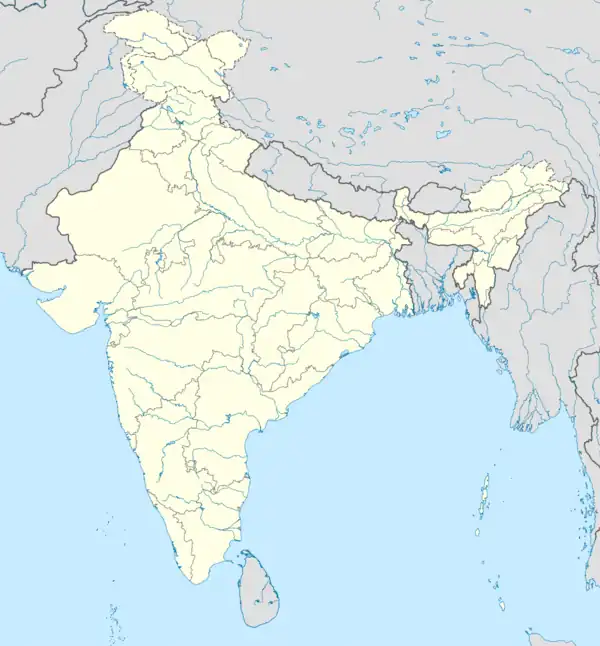Chelad
Chelad (also spelled Chelod) is a census town in the Raniganj CD block in the Asansol Sadar subdivision of the Paschim Bardhaman district in the state of West Bengal, India.
Chelad
Chelod | |
|---|---|
Census Town | |
 Chelad Location in West Bengal, India  Chelad Chelad (India) | |
| Coordinates: 23.639816°N 87.02769°E | |
| Country | |
| State | West Bengal |
| District | Paschim Bardhaman |
| Area | |
| • Total | 3.93 km2 (1.52 sq mi) |
| Population (2011) | |
| • Total | 7,471 |
| • Density | 1,900/km2 (4,900/sq mi) |
| Languages* | |
| • Official | Bengali, Hindi, English |
| Time zone | UTC+5:30 (IST) |
| PIN | 713339 |
| Telephone code | 0341 |
| Vehicle registration | WB |
| Lok Sabha constituency | Asansol |
| Vidhan Sabha constituency | Asansol Dakshin |
| Website | paschimbardhaman |
Geography
MC: Municipal Corporation, CT: census town, N: neighbourhood, R: rural centre
Owing to space constraints in the small map, the actual locations in a larger map may vary slightly
Location
Chelod is located at 23°38′23″N 87°01′40″E.
The Asansol-Durgapur region has undulating laterite soil. This area lies between the Damodar and the Ajay.[1]
Pangachhiya, Majiara, Bhanowara, Domohani, Charanpur (OG), Ratibati and Chelad form a cluster of census towns and an outgrowth on the northern and eastern sides of Asansol.[2]
Urbanisation
According to the 2011 census, 83.33% of the population of Asansol Sadar subdivision was urban and 16.67% was rural.[3] In 2015, the municipal areas of Kulti, Raniganj and Jamuria were included within the jurisdiction of Asansol Municipal Corporation.[4] Asansol Sadar subdivision has 26 (+1 partly) Census Towns.(partly presented in the map alongside; all places marked on the map are linked in the full-screen map).
Demographics
According to the 2011 Census of India, Chelad had a total population of 7,471 of which 3,888 (52%) were males and 3,583 (48%) were females. Population in the age range 0–6 years was 845. The total number of literate persons in Chelad was 5,085 (76.74% of the population over 6 years).[5]
*For language details see Raniganj (community development block)#Language and religion
As of 2001 India census,[6] Chelad had a population of 7,901. Males constitute 56% of the population and females 44%. Chelad has an average literacy rate of 57%, lower than the national average of 59.5%; with male literacy of 68% and female literacy of 44%. 12% of the population is under 6 years of age.
Infrastructure
According to the District Census Handbook 2011, Bardhaman, Chelad covered an area of 3.93 km2. Among the civic amenities, it had 1.5 km roads with open drains, the protected water-supply involved service reservoir, tapwater from treated sources, uncovered wells. It had 800 domestic electric connections and 40 road lighting (points). Among the medical facilities, it had 2 dispensary/ health centres, 2 charitable hospitals/ nursing homes, 2 medicine shops. Among the educational facilities it had were 3 primary schools, 1 secondary school, the nearest senior secondary school at Asansol 13 km away. It had 5 non-formal education centres (Sarva Shiksha Abhiyan). An important commodity it produced was furniture. It had the branch office of 1 nationalised bank.[7]
Education
Chelad has two primary and one higher secondary schools. The high school set up in the 1976 and its third batch produced multi starer like Swapan Maji, Kaushik Maji under the direct supervision of its HM Manindra Maji.[8]
References
- Chattopadhyay, Akkori, Bardhaman Jelar Itihas O Lok Sanskriti (History and Folk lore of Bardhaman District.), (in Bengali), Vol I, pp 14-15, Radical Impression. ISBN 81-85459-36-3
- "Census of India 2011, West Bengal: District Census Handbook, Barddhaman" (PDF). Map of Barabani CD Block, page 167 and Map of Raniganj CD Block, page 215. Directorate of Census Operations, West Bengal. Retrieved 31 August 2018.
- "District Statistical Handbook 2014 Burdwan". Table 2.2, 2.4(a). Department of Statistics and Programme Implementation, Government of West Bengal. Archived from the original on 21 January 2019. Retrieved 4 September 2018.
- "The Kolkata Gazette" (PDF). Notification No. 335/MA/O/C-4/1M-36/2014 dated 3 June 2015. Department of Municipal Affairs, Government of West Bengal. Archived from the original (PDF) on 12 March 2017. Retrieved 4 September 2018.
- "2011 Census – Primary Census Abstract Data Tables". West Bengal – District-wise. Registrar General and Census Commissioner, India. Retrieved 18 February 2017.
- "Census of India 2001: Data from the 2001 Census, including cities, villages and towns (Provisional)". Census Commission of India. Archived from the original on 16 June 2004. Retrieved 1 November 2008.
- "District Census Handbook Barddhaman, Census of India 2011, Series 20, Part XII A" (PDF). Section II Town Directory, Pages 1179-1210; Statement I: Status and Growth History, Page 1179; Statement II: Physical Aspects and Location of Towns, Page 1188; Statement III: Civic and other Amenities, Page 1191; Statement IV: Medical Facilities, Page 1196; Statement V: Educational, Recreational and Cultural Facilities, Page 1200; Statement VI:Industry and Banking, Page 1209. Directorate of census Operations V, West Bengal. Retrieved 14 May 2020.
- 7th All-India School Education Survey 2003 Archived 2007-09-27 at the Wayback Machine
